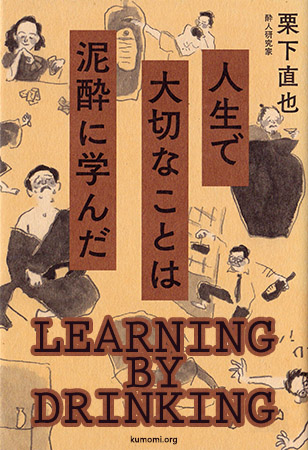(See here for a synopsis of this book.)
You feel so incredibly sick and hungover that you can’t even get up.
I would venture to guess that quite a few of the people reading this book have experienced the aforementioned feeling before. If only you hadn’t gone to that second or third bar last night; no, if only you’d just passed on that last drink.
But lying in bed regretting such matters isn’t going to solve anything.
Just as it is apparently important for a company employee to remain at work even when they’re doing absolutely nothing, I have similarly been told by many people older and wiser than me how, come hell or high water, company employees must always strive to make their way to the office, no matter what.
I must say, though, that it has always been a mystery to me how a human being who literally has to crawl their way to the toilet could possibly make it to the office of all places.
When one finds themself in a situation like that, there tends to be a feeling of utter hopelessness. “Okay, I’m screwed. I don’t think I can make it to work today. I’m officially a failure as a human being.”
And yet, people just never seem to learn from their experiences.
Somehow, in the face of death, you manage to make it to work. You endure it, drenched in greasy hangover sweat. And somehow, just past afternoon you suddenly begin showing signs of life again. Then, as the evening rolls around, you find that the red lanterns of all those bars are suddenly calling out to you once more. Twenty-four hours later, you’re once again face-to-face with the toilet bowl. You’d sworn you wouldn’t go last night. But go you did.
It’s the “Drunkard’s Dilemma.”
Or, well… What it really is is one step short of being your everyday alcoholic.
Japanese society has been described as one in which failure is not tolerated. If you go off the rails once, it’s tough to make it back. “Organizational logic” always puts more emphasis on deducting rather than awarding people points.
But it’s not just how you do your job; it’s also the impression you give your coworkers when you’re doing it. It’s one thing to show up at work in the morning staggering in a daze if it’s just once a month. But once you holing up at the office toilet becomes a weekly thing, who knows what kinds of nicknames they’re going to give you. You will at the very least be labeled a screw-up, that’s for damn sure.
And, of course, while they might claim that “everything goes at the drinking table!,” if you take those words literally and you start treating your boss like they’re not your boss, or if you happen to take a drunken swing at that junior colleague of yours, it’s instant game over.
But alas, life doesn’t just end when you make a drunken mistake.
Really, if anything, what’s important is how you deal with the consequences of your drunken mistakes, and how you live your life despite being a bad drunk. The problem is, though, that people who have fallen off the rails aren’t in a position to talk about life lessons, and even those who do succeed in life despite their penchant for getting sloshed, they usually don’t have all that much to say.
Thus, the concept of this book is learning about worldly wisdom from the drunken escapades of great people.
Looking at a wide range of topics pertaining to the average working adult, from commuting to work, climbing the corporate ladder, party behavior, risk management, and health, we will link these themes with the drunken mistakes of eminent figures and learn from these people whatever there is to be learned.
Despite the growing trend among today’s young people to abstain from the drink, Japanese corporate environment is still closely connected to alcohol. It’s no exaggeration to say that the outcome of your work life depends entirely on how you deal with your co-workers, bosses, or business partners when you’re at the bar and their behavior suddenly changes—not to mention when you yourself happen to have too much to drink. Even if you are personally a non-drinker, this book will surely offer many useful tips on things like how to do deal with that useless boss of yours.
This book covers a broad range of figures, including writers, politicians, athletes, actors, and thinkers. Even if you read these stories purely as biographies of these people, you might be in for some surprising discoveries.
Author Dazai Osamu pulling a dine-and-dash and abandoning his friend at a restaurant. Politician Kuroda Kiyotaka being suspected of slaying his wife. Actor Mifune Toshiro swinging around his samurai sword night after night with complete disregard for his family’s humiliation. Critic Kobayashi Hideo—known as the “God of Literary Criticism”—falling off the Suidobashi Station platform with a big bottle of sake in hand.
Even though these people were all drunk, that doesn’t excuse the fact that they did some terrible things. And yet, despite this, their lives are now written about in textbooks as success stories, and within their respective industries they’re all treated as legends. Even though they made mistakes, these people were all successful in their own way.
Some might be inclined to make a generalization and say that they could only get away with it because it was a “different time.” However, these people certainly received their fair share criticism and ridicule even back in their time—it isn’t difficult to imagine, what with the concept of privacy being nonexistent back then.
And yet, these individuals still lived their lives with their heads held high.
“You should just be proud about getting rip-roaring drunk all the time.” That’s not what I’m saying. What I am saying is that there’s no point in endlessly dwelling on things.
My hope is for the working adults of today—even as they might be concurrently engaged in introspection—to use this book as a prescription for making their own lives brighter.


